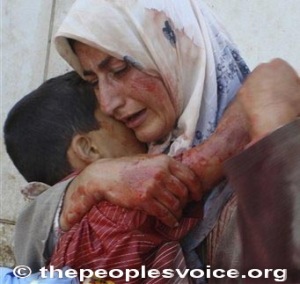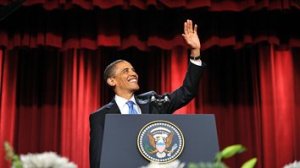
When Omar and I were waiting for the 44 bus in J.F. Kennedy Street in Center City Philadelphia, a small picture stuck on the bus stop drew my attention. I went closer to see who the person in it was. As I reached it, I found out it was Sharon’s, former Israeli Prime Minister.
The sticker carried a website address which eventually appeared to be a blog address. In all cases, I wasn’t interested. Sharon is the last person on earth that I would care about or hear what is happening to him.
However, I stopped for a minute staring at the photo not because Sharon was on it but because memories flashed back into my mind, memories of the Zionists and the Jews.
There was one advantage I learned from this war, I told Omar. He looked at me and asked, “which war?” The latest one, I replied. I learned how to differentiate between the term “Zionist” and “Jew”.
He looked at me in daze! “Yes, it’s only in 2003 that I learned what the difference between these two words is.” There were so many questions in his mind. I didn’t wait for him to ask them. I explained why it’s just recently that I learned that difference.
At home, we never discussed politics, NEVER, period. My parents were so cautious about these things. Any mistake would take all of us, if not all of my tribe, to jail or execution by Saddam’s people. One of the things we did not discuss at home was who the Jews and the Zionists are. It was only once I recall my mother and grandmother talking about their Jewish Iraqi neighbors and friends whom they missed. I was 12 or 13 at that time. I asked both of them about it. My mother sighed and said that the Iraqi Jews were very nice and lovely people. That was it. She never mentioned anything after that neither did my grandmother.
I was like most teenagers whose main source of news was Saddam’s regime’s media outlets and school curricula. They all denounced the “Jews”. None of them clarified what the difference was. Like most of those in my age, I was brain washed. I was taught to hate the “Jews”, all of them, not only the “Zionists”.
I tried to know more about what is happening in Palestine but all of what I learned was how the “Jews” occupied Palestine and established their illegal state. I asked my parents a lot about it. I got nothing. They always told me not to be indulged in such conversation with anyone, even inside the house. My father’s attitude was if you say it here, you’d say it outside and that would lead to the execution of the family if not the whole tribe if Saddam’s men discover that we were questioning this issue. “Always be away from politics and such issues,” I remember him saying.
When I was in undergraduate school, I didn’t know anything about how journalism works. When the second Intifadha occurred in September 2000 between Palestinian Arabs and Israelis, I was full of hatred. I hated the “Jews”. I didn’t know that this term was far broader than what is happening in Palestine. I was forced to join the protests organized by the Baath Party to denounce the “Jews”.
Before 2003, the term “Jews” among most Iraqis in my age meant the Zionists. I even recall how a rumor was spread in my undergrad school when one of my classmates said that a member of the “Backstreet Boys” band is Jewish. Most of the classmates told her that “this was untrue. It seems there was someone trying to distort the reputation of the band in Iraq”. She swore she read that in an American magazine smuggled through Jordan. No one believed her. Eventually, she stopped talking about it.
It is also ironic that one of the text books I had in my undergrad school was written by Noam Chomsky. It was about Linguistics. I recall my professor saying that Chomsky was a Jew who is against the State of Israel! He did not elaborate and none of the students asked him more about it. No one wanted to be in trouble. I kept wondering how come he is Jewish and he’s against the State of Israel which we called the “Zionist Entity” at the time. I found no answer till after the 2003 war.
Finally, the confusion I had and the decades of misinformation have come to end. After the invasion, I was able to start the investigation by myself. Saddam was gone. It was time to ask without being fearful.
The first thing that clarified things to me was when I worked with American journalists. I discovered that some of them were Jews. I didn’t know what to do. I was afraid and confused. I couldn’t even ask for people’s advice. How come I tell them I work with those whom they hated their entire lives? Should I keep working with them or stop? I wondered. I was torn. “These are Zionists,” I thought at the time until I found out the real difference.
It was through the internet that I first recognized that mysterious difference that was hidden and kept away from Iraqis for decades. It was time to ask more about the Iraqi Jews. Who were they? Where did they go? How do they look like? Were they like the Israeli soldiers killing the Palestinians? And more questions were that were held hostage in my mind for a long time. I let them free. I asked everyone knew an Iraqi Jew. I started with my grandmother. I sat on the brown wooden sofa in her kitchen. We talked for hours. Eventually she cried when she remembered her best Jewish friend Clair who was her neighbor as well. She was one of the thousands of Iraqi Jews who were forced to leave Iraq in the 1940s. She told me all about them. They were like us, Iraqis. She told me that they were very famous of the trade of cloths. My grandfather was a wealthy man whose main cloth merchants were Jewish. He owned several factories of sewing clothes. She narrated stories of how my mother, uncles and aunts had so many Jewish friends who used to go together to the same schools.
She recalled the “Farhood al Yahood”, a pogrom against the Iraqi Jews that took place on June 1-2, 1941 where Jews were injured and murdered, Jewish property was looted, and Jewish houses were burnt down.
For three years now, I think of those people. I kept asking myself, why did that happen to them? They are Iraqis. That was their home as well as mine. I felt so angry and unable to imagine how much I was deceived. I even feel guilty because they were deprived from their homeland by the time we enjoyed it. Sometimes I think what is happening now is heaven’s revenge to what happened to the Jews.
Until this day, I surf the web to read more about them and their traditions hoping to meet up with one of them one day. All what I read is moving and touching. Some of their writings brought tears to my eyes. I remember an article written by Shmuel Moreh, an Iraqi Jewish Professor and Chairman of the Association of Jewish Academics from Iraq in Israel. In his article posted on Ilaf, Moreh described how his uncle cried for Iraq as he was dying in the hospital. He narrated what his uncle went through after the Farhood events until he reached Israel. His last words brought tears to my eyes. He wished he didn’t leave Iraq despite all of what happened to him.
Another Jewish Iraqi website I came across is called Reminisce of Baghdad where the author documented his family’s pictures and tales when they were in Iraq accompanied by Iraqi music. He also linked to other Iraqi Jewish artists who their longing to Iraq is represented in their paintings.
Today, I have many Jewish friends whom I am proud of. Today, I know who they are and what they stand for. But now that I know there is a difference, there are hundreds of thousands Iraqis who don’t. Generation after generation was taught to hate the “Jews”, all the Jews. How are these going to learn the difference? How are they going to love the Iraqi Jews if they consider all of them Israelis?
To all the Iraqi Jews, I take a bow to your love and loyalty to your country which you were forced to leave. One day, all of us will go back to our beloved Iraq and restore our bonds.
baghdadtreasure@gmail.com










